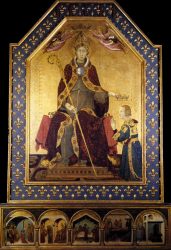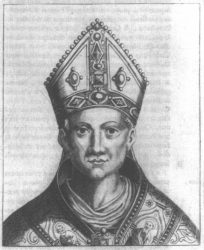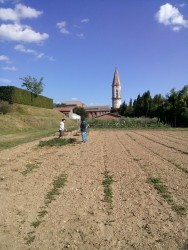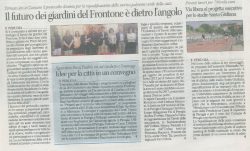
 Dr. Hoch set the scene for the lecture by sharing Francesco Rosselli’s La tavola strozzi, which offers an elaborate illustration of a 15th century view of Naples.
Dr. Hoch set the scene for the lecture by sharing Francesco Rosselli’s La tavola strozzi, which offers an elaborate illustration of a 15th century view of Naples.Dr. Adrian S. Hoch, Art History professor at the Umbra Institute, was recently invited by Dr. Stefania Paone, of the Università della Calabria: Department of Humanistic Studies, to provide a lecture to advanced undergraduate and MA students. Though Dr. Hoch presented in Italian, her lecture’s English title was A Candidate for the Second Lost Reliquary Bust of St. Louis of Anjou.
The lecture took place during the last week of the students’ spring term and Dr. Hoch was accompanied by Katharina Weiger, a German graduate student pursuing a PhD at Freie Universitet in Berlin. Dr. Hoch and Ms. Weiger were given the goal of not only providing a relevant lecture on art history, but also introducing Italian students to the methodology and approach applied to the study of art by international academics from different cultures and backgrounds.

In general, Dr. Hoch’s lecture covered the ruling family of late-medieval Naples, the Angevin dynasty. The Angevin dynasty had their own family saint, Saint Louis. St. Louis was the older brother of King Robert of Anjou, who’s wife was Queen Sancia. Throughout the lecture, Dr. Hoch explained the history and importance of St. Louis’ short life, as well as his relationship to his brother, and the expensive objects that King Robert and Queen Sancia, after their relative’s death, ordered to hold the valuable relics of St. Louis.
Click here to view courses taught by Prof. Hoch at the Umbra Institute.




 The UN Paris Climate Agreement was signed by leaders of nearly 200 countries with the goal of addressing climate change, sustainable development and food production, and poverty (Article 2). It plans to do so by lowering greenhouse gas emissions, specifically targeting anthropogenic pollutants.
The UN Paris Climate Agreement was signed by leaders of nearly 200 countries with the goal of addressing climate change, sustainable development and food production, and poverty (Article 2). It plans to do so by lowering greenhouse gas emissions, specifically targeting anthropogenic pollutants. Click here
Click here The Frontone Gardens
The Frontone Gardens